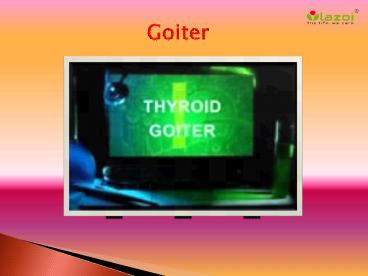Goiter: Read about symptoms, causes and treatment (1) - PowerPoint PPT Presentation
Title:
Goiter: Read about symptoms, causes and treatment (1)
Description:
Goiter refers to an abnormal growth of your thyroid gland. Though goiters are typically unproblematic, a large goiter can cause a cough and make it difficult for you to swallow or breathe. – PowerPoint PPT presentation
Number of Views:102
Title: Goiter: Read about symptoms, causes and treatment (1)
1
Goiter
2
Goiter
- Goiter refers to an abnormal growth of your
thyroid gland. Though goiters are typically
unproblematic, a large goiter can cause a cough
and make it difficult for you to swallow or
breathe. A goiter can be result of over- or
underproduction of thyroid hormones or lumps that
develop in the gland itself.
3
Contributory factors causing goiter
- Suffering from goiter doesn't necessarily mean
that your thyroid gland is working abnormally.
Even when it's inflamed, your thyroid may produce
normal amounts of hormones. It might also,
however, produce inadequate levels
of thyroxine (T-4) and T-3 (triiodothyronine)
hormones. There are a number of reasons behind
swelling of your thyroid gland - Iodine deficiency Iodine is the prime
requirement for the production of thyroid
hormones and is found in seawater and in the soil
of coastal areas. A diet which lacks iodine is
the main cause of goiter. It is not a case in
countries where iodine is routinely added to
table salt and other foods.
4
Contributory factors causing goiter
Continue
- Graves' disease Goiter can sometimes occur due
to overproduction of thyroid hormone
(hyperthyroidism). In Graves' disease, antibodies
produced by your immune system accidently attack
your thyroid gland causing it to make surplus
thyroxine. This in turn causes the thyroid to
swell. - Hashimoto's disease Goiter can also occur due to
underproduction of thyroid hormone
(hypothyroidism). Hashimoto's disease is an
autoimmune disorder which damages your thyroid so
that it produces too little. The pituitary gland
then makes more TSH to stimulate the thyroid
which causes the gland to enlarge. - Multinodular goiter In Multinodular goiter,
several nodules develop in both sides of your
thyroid, resulting in swelling of the gland. - Inflammation Thyroiditis is an inflammatory
condition that can cause pain and swelling in the
thyroid. It may lead to hyperthyroidism or
hypothyroidism.
5
Symptoms
- Not all goiters have signs and symptoms, but
when they do, it includes - A noticeable inflammation at the bottom of the
neck that may be particularly obvious when you
shave or put on makeup - Heaviness in your throat
- Coughing
- Change in voice
- Difficulty swallowing and breathing
6
Treatments
- Treatment for goiter depends on its size,
symptoms and the underlying cause.
Your endocrinologist may suggest - Supervision If your goiter is not too large and
doesn't cause problems, and your thyroid is
functioning normally, your endocrinologist may
ask you to adopt a wait-and-see approach. - Medications If you have hypothyroidism, your
doctor will prescribe Levothyroxine, which will
resolve the symptoms of hypothyroidism and slow
the release of thyroid-stimulating hormone from
your pituitary gland, often decreasing the size
of the goiter. For swelling of your thyroid
gland, your doctor may suggest aspirin or a
corticosteroid medication to treat the
inflammation.
7
Treatments
Continue
- Surgery Removing all or certain portion of your
thyroid gland is an option if you have a large
goiter thats causing problems. Surgery is also
recommended for thyroid cancer. Post surgery, you
may need to take Levothyroxine depending on the
amount of thyroid removed. - Radioactive iodine In certain cases, radioactive
iodine is used to treat an overactive thyroid
gland. It is taken orally and reaches your
thyroid gland through your bloodstream,
destroying thyroid cells. The treatment
significantly reduces the size of the goiter. - Continuous monitoring of your condition may be
required is symptoms reappear.
8
CONNECT WITH US
- Logon to
- www.lazoi.com
- Like us on Facebook
- https//www.facebook.com/LazoiTheLife
- Follow us on Twitter
- https//www.twitter.com/lazoithelife
- Follow us on Pinterest
- https//www.in.pinterest.com/lazoithelife































